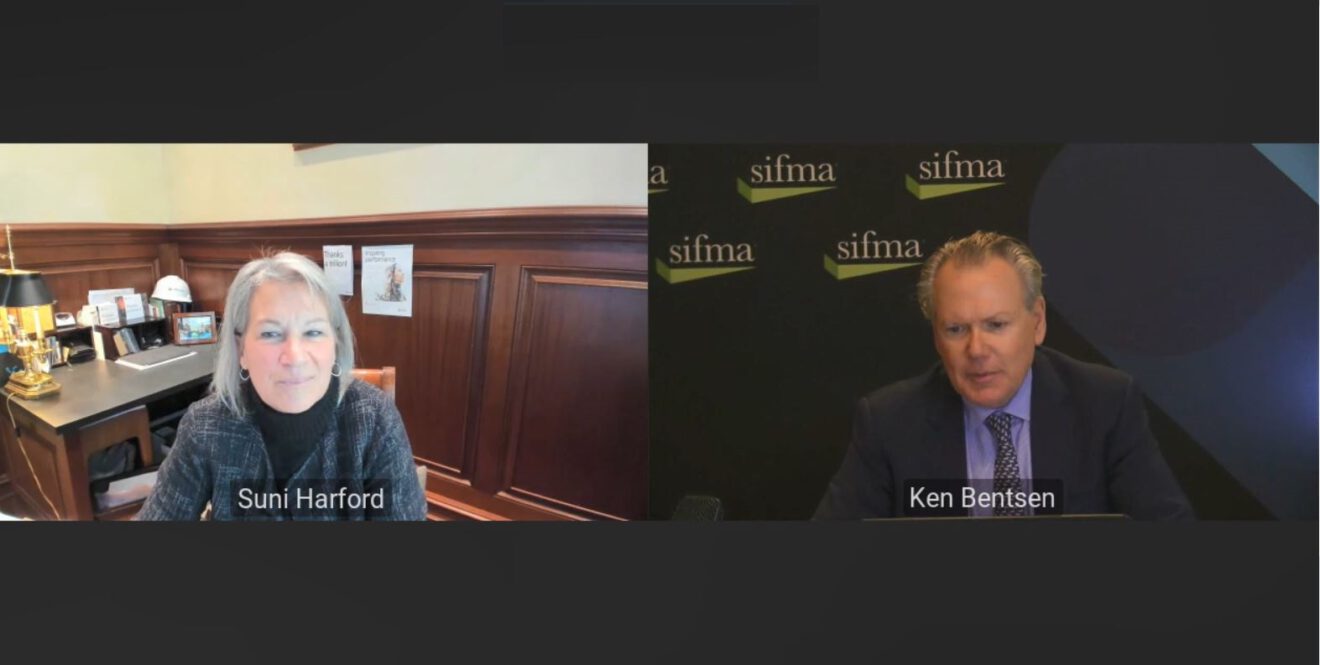It won’t be long before applying environmental, social and governance criteria to assets is no longer seen as a particular sector within investment, but ubiquitous to all investing, financial executives told SIFMA’s Annual Meeting.
This year’s conference, which brought together leading figures throughout the banking, asset management and advisor sectors, was held the same week as the COP26 global climate summit, during which some 450 financial firms worldwide pledged to hit net-zero carbon emissions targets by 2050, and a global standard-setter for ESG labeling was established.
The ramping up toward unified standards in green investing underpinned a lot of the event’s discussion, particularly among those in the asset and investment management space.
Marty Flanagan, president and CEO of Invesco, said within a few years “we’re not going to talk about ESG as something separate from investing.”
“It’s not a marketing gimmick, it’s something that’s fundamental to investing and I think that’s really where things are moving very, very rapidly,” Flanagan said.
While financial firms are widely embracing the shift, the swift rate at which it is accelerating is increasingly client-driven, said Suni Harford, president of UBS Asset Management and UBS Group executive board sponsor for sustainability and impact.
Harford said a recent UBS survey of high-net-worth clients found two-thirds of respondents view sustainability as highly important to their portfolio performance, and 78% believe sustainable investments will maximize their returns.
“So it’s not just about aligning their values with their investments anymore,” Harford said.
“Rational investors who are first and foremost looking to increase their returns increasingly believe that sustainability offers greater upside than conventional investing.”
This underscores the important role asset and investment managers play in educating their clients on such matters, Harford said. She said the primary responsibility of firms in this area is “to raise awareness of, and help our clients manage, the sustainability risks in their portfolios,” rather than tell them what the objectives for their portfolio should be.
“Our job is to provide them with the choice they seek to affect the changes they want to see,” Harford said.
Deputy US Treasury Secretary Wally Adeyemo told the conference that the financial industry’s efforts to mobilize capital toward sustainability efforts is a crucial component to combating the existential threat of climate change. The commitment by the Glasgow Financial Alliance for Net Zero, whose firms account for some $130 trillion of assets, to reach net-zero carbon emissions in their portfolios by 2050 marks a breakthrough on that front, but more transparency is needed to ensure those efforts are effective, Adeymo said.
“Fundamentally the truth here is that in order for us to go from making commitments to actually accomplishing things, it’s going to require that these targets be credible and transparent to drive accountability,” Adeymo said.
Efforts by regulators to establish clear and unified labeling standards will also help the space mature, Flanagan said, noting that the stigma associated with the “greenwashing” of portfolios is harmful to the industry at large.
“[Greenwashing is] not good for the industry and I think it’s a good thing that regulators are taking that up, because it causes a problem for everybody,” Flanagan said.
Harford cautioned, however, that the need for funds that don’t meet sustainable criteria will always exist, and that the rapidly growing regulatory framework surrounding sustainable investing should remain flexible enough to accommodate evolution in the space.
“We surely need regulation but it must be flexible enough to keep up with the pace of change, and we must be very careful about drawing too fine a point on what is and what is not sustainable today or else we might stifle much needed innovation tomorrow,” Harford said.
